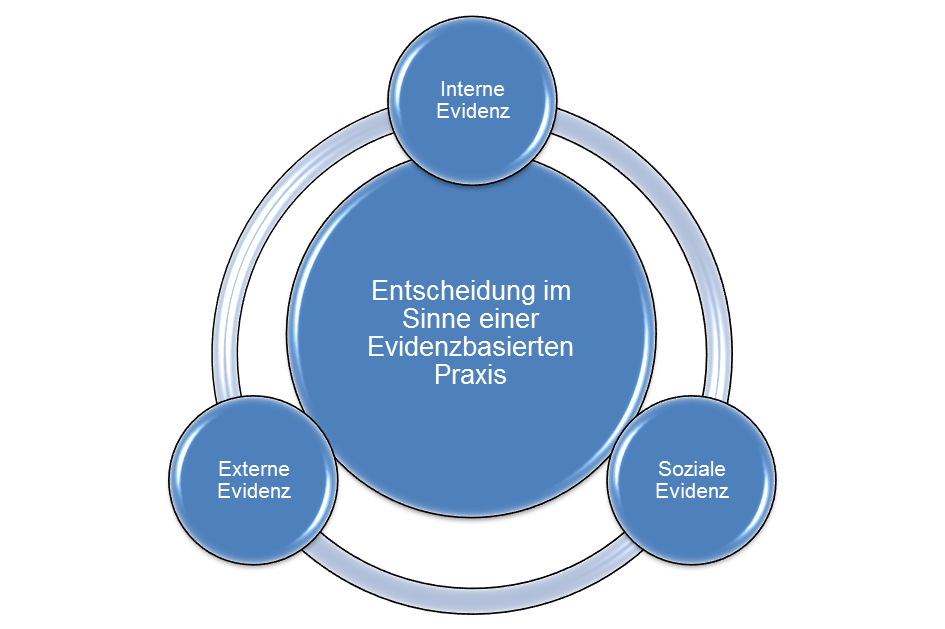EbP - What does it mean?
Evidence-based practice (EbP) has been a keyword in the German-speaking (special) education discourse for the past few years. But what exactly does the term actually conceal?
Most of the academic discourse about EbP in the domain of special education solely focus on the scientific evidence of the effectivity of educational measures (so-called external evidence). In our view, the individual competence and experience of the expert (so-called internal evidence) as well as the preferences and needs of the client (so-called social evidence) should also be included into the diagnostic procedure. Accordingly, three aspects of evidence build the foundation on which every decision for a treatment or therapeutical measure should be made.
EbP - What is the purpose?
If we transfer the above mentioned criteria to special educational contexts it becomes apparent that evidence-based decisions on didactical methods, lesson materials and supporting interventions should be made on the basis of valid scientific findings defined by professional educators on the one hand and specific needs of school children and their parents on the other hand. In the end it is the purpose to find the most optimal and suitable implementation strategy for everyone involved.
EbP - How does it work?
A Guideline for Assessing the Validity of Evaluation Studies
Assessing the validity of evaluation studies is a problem for evaluating current evidence of effectivity. For this matter, our project team has elaborated an assisting guideline. At present, the University of Rostock is working on an online tool that enables teachers to use the guideline online. After its completion it will be accessible via this web page.
Criteria to Evaluate Lesson Materials for Elementary Schools
A further problem is caused by the fact that several studies are still due that want to prove the effectivity of various lesson materials and textbooks. For this reason, the purpose of making an evidence-based decision about lesson materials cannot be realized in every learning field and development area. This is particularly problematic as teachers are coping with a vast amount of available materials, books and theoretical frameworks. Nonetheless, it should always be considered that an evidence-based effectivity of textbooks and materials is necessary. In the meantime, we advise to use scientifically approved materials and training programs.
Reflecting findings from different academic disciplines, the article What does evidence-based mean? - Criteria for a scientifically approved decision on materials for math classes at elementary schools by Voß, Sikora and Hartke (2015; title originally in German) delivers a summary of the most substantial criteria that are relevant when deciding which textbook to use in mathematics. Based upon these criteria, the University of Rostock elaborated a catalogue that provides a scientifically sound choice of math lesson materials that are suitable for elementary schools. It aims at helping the user to assess and evaluate a new textbook or to critically reflect on the materials he or she is using so far.
At the same time, a list of criteria for deciding on suitable textbooks in the subject German has been compiled. Every list can be downloaded as pdf files.
- KriterienkatalogZurMaterialauswahl-Mathematik_VossSikoraHartke_01.pdf List of criteria for making scientific-based decisions on maths lesson materials at elementary schools
- KriterienkatalogZurMaterialauswahl-Deutsch_DiehlVossSikoraHartke_01.pdf List of criteria for making scientific-based decisions on German lesson materials at elementary schools
- KriterienkatalogZurMaterialauswahl-Foerderverfahren_BlumenthalMahlauVossHartke.pdf List of criteria for assessing the external evidence of practicing, supporting and therapeutic procedures
- PfadmodellExterneEvidenz_BlumenthalMahlauVossHartke.pdf A path model for assessing the external evidence of practicing, supporting and therapeutic procedures
Furthermore, an online tool for assessing various lesson materials is in progress and will be accessible via this web page.
References
Beushausen, U. (2014). Chancen und Risiken einer evidenz-basierten Sprachtherapie. Logos, 22, 96-194. Blumenthal, Y. & Mahlau, K. (in progress) Evidenzbasierung in der schulischen Sonderpädagogik. Zeitschrift für Heilpädagogik.
Fingerle, M. & Ellinger, S. (2008). Sonderpädagogische Förderung im Vergleich. In: M. Fingerle & S. Ellinger (Eds.), Sonderpädagogische Förderung im Vergleich (S. 7-10). Stuttgart: Kohlhammer.
Hartke, B. (2005). Schulische Prävention – welche Maßnahmen haben sich bewährt? Zeitschrift für Heilpädagogik, 56 (12), 470-481.
Hartmann, E. (2013). Evidenzbasiertes Denken und Handeln in der Logopädie/Sprachheilpädagogik. State of the Art und Perspektiven. Vierteljahreszeitschrift für Heilpädagogik, 4, 339-343.
Nußbeck, S. (2007). Evidenzbasierte Praxis – ein Konzept für sonderpädagogisches Handeln? Sonderpädagogik, 37 (2/3), 146-155.
Voß, S., Sikora, S. & Hartke, B. (2015). Was heißt hier Evidenzbasiert? – Kriterien zur wissenschaftlich begründeten Auswahl von Materialien für den Mathematikunterricht in der Grundschule. Zeitschrift für Heilpädagogik, 2, 85-101.

